Interview with ATRO
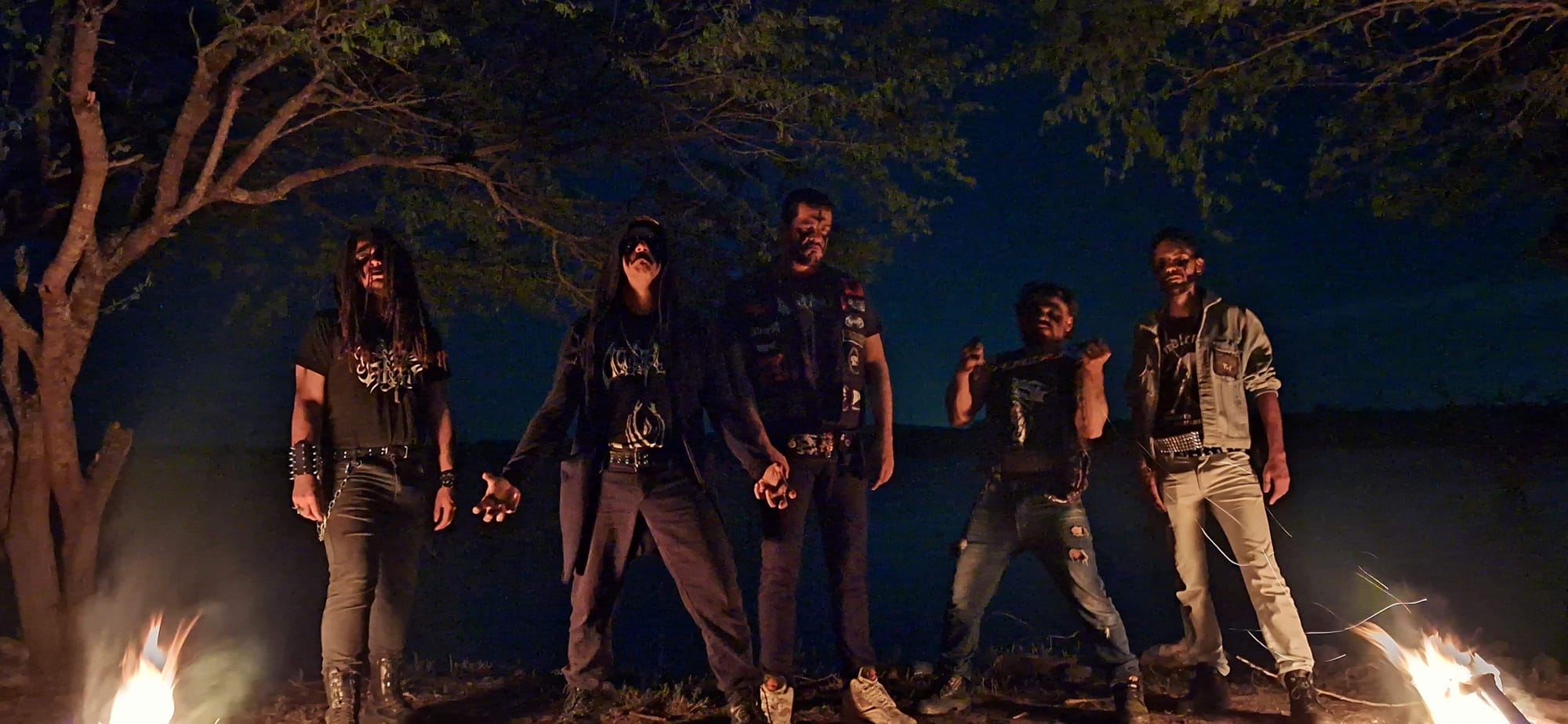
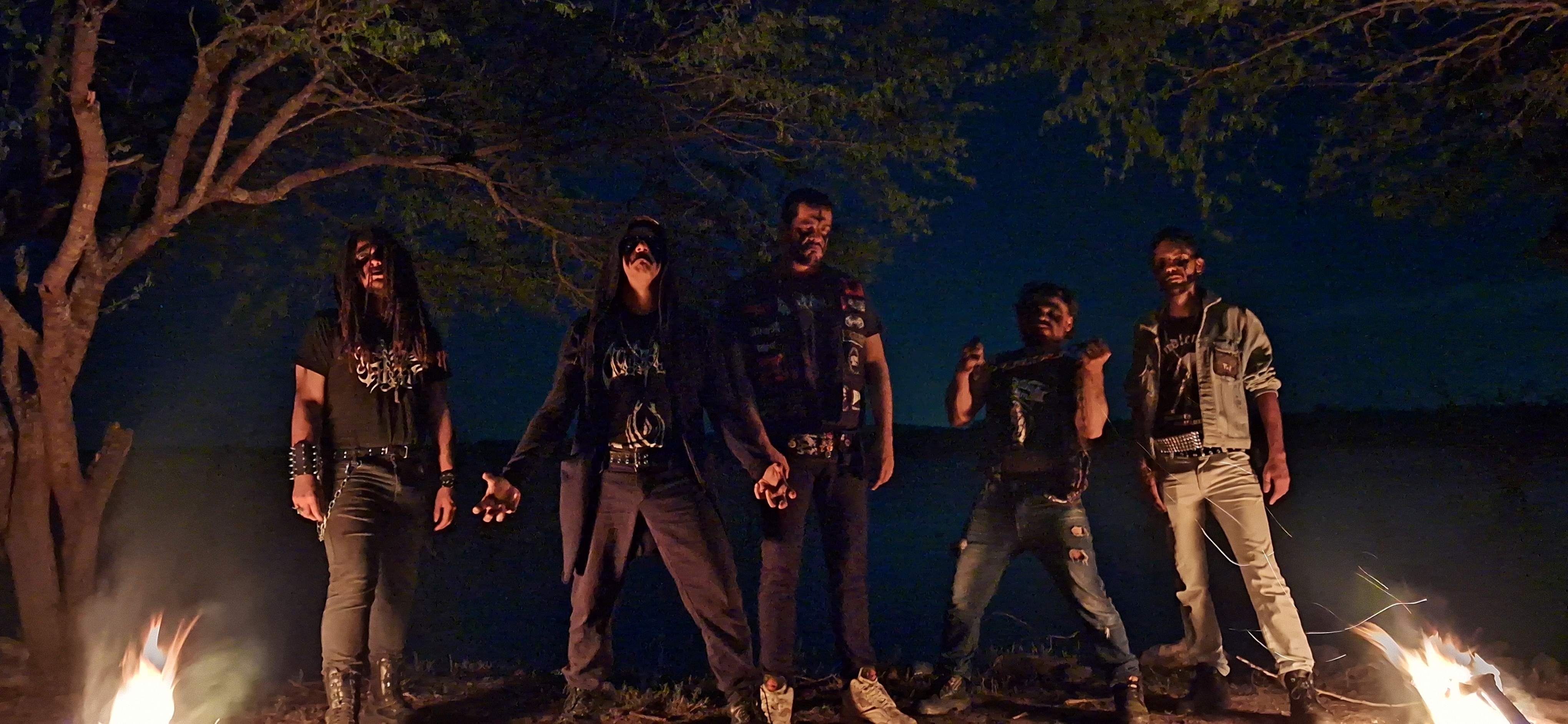
!!!DEATH/DOOM METAL FROM BRAZIL!!!
Welcome to the FILTHY DOGS OF METAL Webzine.
Tell us a few things about ATRO (Members, Starting Year etc).
First of all, thank you! It’s a tremendous honor to be featured in this damned space! ATRO was born from the ashes of a former band in which Davidson (guitar), Marcos Kovot (bass), and I — Alisson Hell (drums) — had played together since 2016. The three of us shared a deeper artistic vision, so we decided to move forward with a new and darker project. While we preserved the Doom essence, we plunged even further into the shadows, incorporating elements of Death Metal and Black Metal, with lyrics that became increasingly profound and abyssal.We began rehearsing in early May 2022, still as a trio. However, it was clear that we needed to summon another wandering soul to take over vocals and a second guitar. That’s when we invited Pedro Rot to roar through ATRO’s veins. He had been a longtime friend, so there was no doubt in our minds — he was the one meant for the role. In mid-2024, while Davidson was away handling personal matters, Akenaton filled in for a few live performances. The chemistry was immediate, and he ended up joining the band permanently, taking over as our second guitarist. ATRO is a Death/Doom Metal entity — dark, heavy, and extreme. Our lyrics are written and performed in Portuguese, delving into themes of inner abyss, introspection, nihilism, individualism, and other subjects that explore the depths of the human psyche. The band’s name, in our native tongue, refers to something that brings sorrow — of ill omen; ill- fated, obscure.
You have recently released your album ''O Eremita''. What is the feedback from your audience as well as from the press?
The feedback on our album has been very positive. We recently held a release show in our hometown and were genuinely surprised by the audience’s response — especially considering that our subgenre is still rarely explored in the local underground scene, which is mostly dominated by Death, Thrash, and Heavy Metal. That said, we know we still need to improve our promotion. We're currently producing physical CDs, and soon the full album will be available on other digital platforms — for now, it can only be found on YouTube. As for the press, we deliberately avoid mainstream media channels. That’s simply not our path. We walk in the shadows, fully rooted in the underground. In Brazil, the media rarely offers any space or visibility to this kind of sound anyway. That’s why we seek out true underground allies — like Filthy Dogs of Metal — who genuinely support and cultivate the darker flame of extreme music. The underground survives and thrives thanks to people like you.
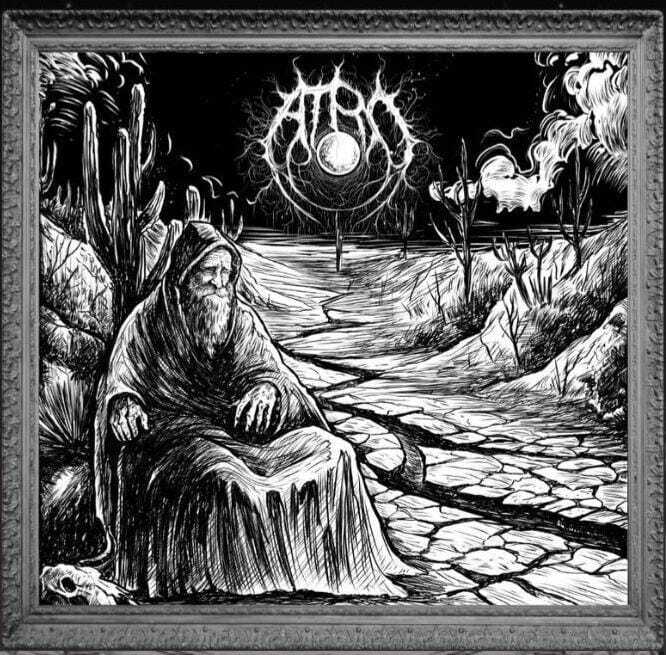
Label or DIY and why?
We have always embraced the do-it-yourself ethic — it's something that dates back to our previous band. This approach stems not only from necessity but also from an ideological stance. It allows us to retain full control over our art, without compromise or dilution. Fortunately, we’ve crossed paths with a few kindred souls who have supported us and made our journey easier in certain ways. A good example is the Single A Studio, where we recorded our material, and our close friend Nildo, who runs The Pub — a place that offers us affordable space for both rehearsals and live events. Furthermore, all of our CD copies, shirts, and other merchandise are produced entirely by our own hands. Everything is created almost entirely in-house, within Atro itself. Each item carries our essence, our sweat, and a fragment of the darkness that fuels the soul of this band.
Is there any funny or weird story from the recordings or from your live shows that you would like to share with us?
(Davidson) I remember during the recording sessions, we had to listen closely to the guide tracks over and over — layering a second guitar, mixing specific parts, fixing small details. It was an intense and immersive process. But what really marked me were the dreams... or rather, the nightmares. I kept waking up from vivid dreams where Pedro, our vocalist, had died. At first, I thought it was just the stress and exhaustion getting to me. But when I shared it with the other members, they had experienced almost the same dream. It was eerily similar, as if something beyond the music was trying to whisper through our subconscious. It left a strange, heavy atmosphere in the rehearsal room for days. There are things we can explain — and others
we simply endure.
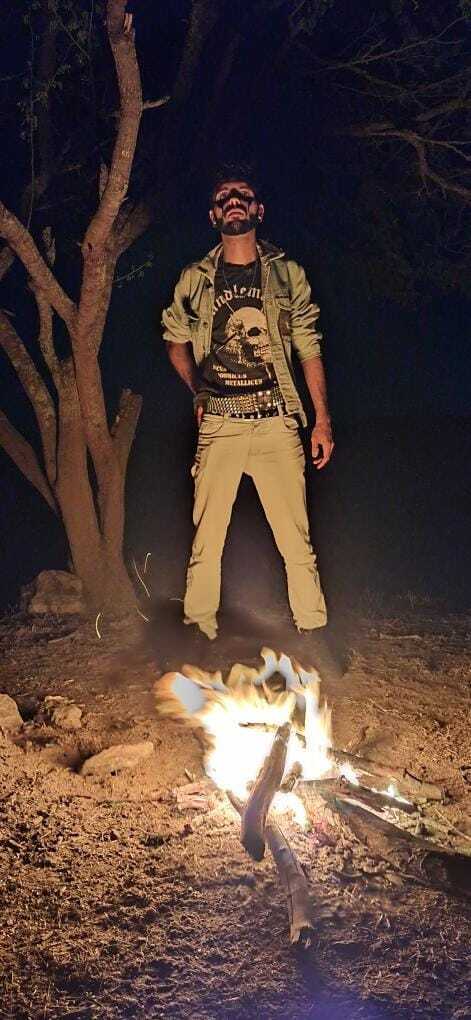
Davidson
Do you prefer Vinyl, Tape, CD or Digital Format and why is that?
Without a doubt, vinyl is the ultimate format for listening to Heavy Metal. There’s something ritualistic, almost mystical, about placing the needle on a record, feeling the weight of the artwork in your hands, and hearing that raw, dense sound that only vinyl can deliver. However, the reality in Brazil makes this dream much harder to achieve. We live in a country marked by deep inequalities, where every step forward feels like a battle. While in parts of Europe access to certain resources may seem trivial, here it’s a constant struggle. Recording high-quality material, pressing LPs, designing full-size inserts… all of it demands a heavy financial investment — one that, for an underground band, rarely promises any real return. Because of that, we’ve chosen CDs as our main format: they’re more affordable, they still offer a tangible experience, and they deliver solid audio quality. We also release our music on digital platforms, since they allow us to reach new souls willing to dive into the depths of our sound. But let it be known: if conditions were different, vinyl would absolutely be our top priority. There’s a certain weight — an atmosphere — that emerges the moment the stylus touches the groove… and that feeling is simply irreplaceable.
Your music style is Death/Doom Metal. Which are your main influences (Favourite Artists / Bands etc.)
Great question — and quite a complex one! Atro is made up of members with diverse backgrounds across a wide spectrum of extreme metal subgenres, and it’s exactly this fusion of influences that shapes our sound.Marcos Kovot (bass) played for years in a hardcore/crossover band called T.O.S.I., although he's always had a deep passion for extreme metal. Alisson Hell (drums), on the other hand, spent many years in the old-school thrash metal band NECROSE, but often cites Carnivore (Peter Steele’s former band) and the powerful Greek band Hierophant’s Descent as his biggest influences in Atro. Davidson (guitar) and Pedro Rot (vocals) had a Black Metal project together back in 2014, channeling a lot of the raw, primal energy of bands like Sarcófago and Emperor. Davidson, however, has always had a deep connection with the more melancholic and atmospheric side of metal — he’s heavily influenced by bands such as early Anathema, My Dying Bride, Tiamat, and Katatonia. Akenaton (guitar) leans more toward the bleak and anguished soundscapes of Depressive Black Metal, adding even more texture to our compositions. In addition, we’re all influenced by the punk ethos, especially the raw and visceral punk scene we’ve experienced here in Brazil. As you can tell, we each come from very different paths — but it’s in this convergence, between aggression and melancholy, chaos and structure, that Atro finds its true voice.
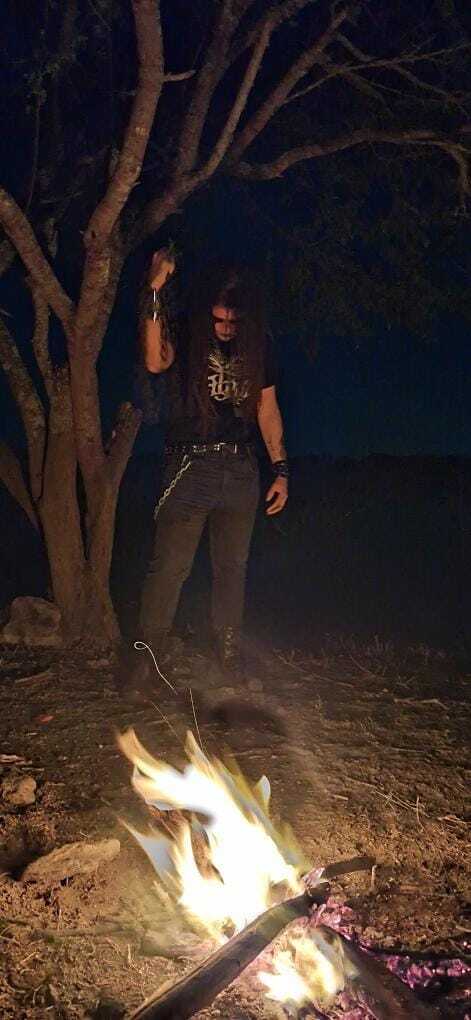
Akenaton
Which things do you think a band should sacrifice in order to succeed? Have you ever sacrificed anything in your life for a better future for your band?
It all depends on what you mean by “success.” That word can take on very different meanings. If we're talking about mainstream success, then yes — a band usually has to sell its soul to the market. You have to shape yourself, polish your image, submit to external interests, and still be lucky enough to be picked up by a label willing to capitalize on you. We've never pursued that kind of success… In fact, just imagining it makes us sick. That path often demands a heavy toll: the death of creative freedom. And for us, that is absolutely non-negotiable. Now, if we're talking about success within the underground scene — or rather, achieving greater visibility — then the sacrifice takes a different form. We face the contradiction of having to engage more with social media, feed algorithms, create constant content… even though all of that often clashes with the very essence of the music we make, which is heavy, slow, oppressive, and meant to go against the current. But when it comes to the kind of success we, in ATRO, truly seek… we believe we’ve already achieved it: we managed to unite five individuals who share the same dark vision and intense passion for music. We compose, record, perform live, support each other — and, above all, create something we genuinely love. A form of music that is extreme, brooding, grotesque, and crushing. If that’s not success, then success was never meant for us.
Describe your ideal live show as a performance band. Have you already experienced that?
We don’t have a fixed idea of what an “ideal show” should be. Every performance is a unique moment, filled with unpredictability, emotion, and its own atmosphere. And it’s precisely that unpredictability that draws us in. It teaches us, transforms us as individuals, and strengthens us as a group. We feel most at home in underground spaces, where the connection with the audience is raw, direct, and real. It’s in those smaller, often improvised venues that we can express ourselves more truthfully — without filters, without barriers. That’s why we’ve chosen to remain in this scene: because it allows us to keep the essence of who we are and what we create alive. Our shows are not choreographed rehearsals — they’re visceral manifestations. Each member brings something from within and turns it into sound, energy, and presence. It’s a moment where what’s inside finally finds a way out. Maybe we’ve never experienced “the ideal show,” and honestly, maybe it doesn’t even exist — because the true beauty lies in the fact that each experience is unrepeatable.
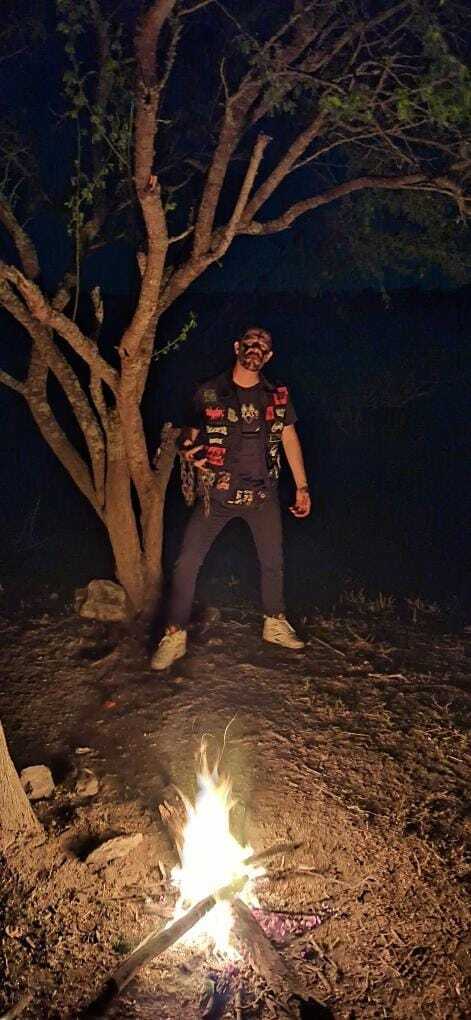
Hell
What attributes do you think that a new Death/Doom Metal Band should have in order to gain identity and be unique?
A Death/Doom band that truly wants to build its own identity needs to stop following tired formulas and start paying real attention to the roots of the genre — especially the material from the ‘80s and late ‘90s. Bands like Cathedral, Candlemass, and Black Sabbath laid down the foundations with raw heaviness, sorrow, and originality. Nowadays, too many bands seem to forget that and dive headfirst into melodic death metal or sprinkle in bits of folk just to sound “different” or more marketable. To us, that often feels like dressing up something hollow in fake glitter. We believe it's entirely possible to create heavy, dragging, haunting music without all the frills and fake polish. We’re not interested in sounding “sellable” — our sound has to reflect who we are, not what some algorithm thinks will trend. Old school influences should be a compass, not a cage. What we strive for is to build something of our own: organic tones, suffocating atmosphere, existential lyrics, and unpredictable song structures. Our music is slow, grotesque, and emotional — and all of it comes from lived experiences, frustrations, and our worldview. You can’t be authentic by copying others. Either you spit out what’s inside you with raw honesty, or you’re just acting. In the end, a band seeking identity needs the guts to stand firm and be exposed. You can’t please everyone and still stay real. And if we have to choose, we choose to be real.
Do you believe that Digital Platforms help the new Death/Doom Metal Bands? Which, do you think, is the ideal way for a band to promote its work?
Yes, digital platforms are a double-edged sword for Death/Doom Metal bands. On one hand, they provide visibility that would have been unthinkable a few decades ago. Any starting band can upload their music to Spotify, Bandcamp, YouTube, and with a bit of luck, reach a global audience. But on the other hand, this ease of access also means an overwhelming amount of saturation. The market is flooded with bands trying to stand out, and often, if you don't have something truly remarkable, your music gets lost in the noise. The ideal way to promote your work, in our view, is to find a balance between using these platforms and maintaining real contact with the audience. The underground scene, where we fit in, is still crucial. It’s not enough to just send a link and hope for the best. Interaction, live shows, the relationships you build with people who listen to your music—that’s what makes the difference. Social media, live videos, releases, all that helps, but true and effective promotion comes from word of mouth, being present in the underground scenes, performing live, and living the music. It’s on stage, in direct contact with the audience, that the band truly solidifies its identity. And of course, we can’t forget the impact authenticity has. If the band is genuine, it doesn’t matter how many digital platforms exist; it will find its way.
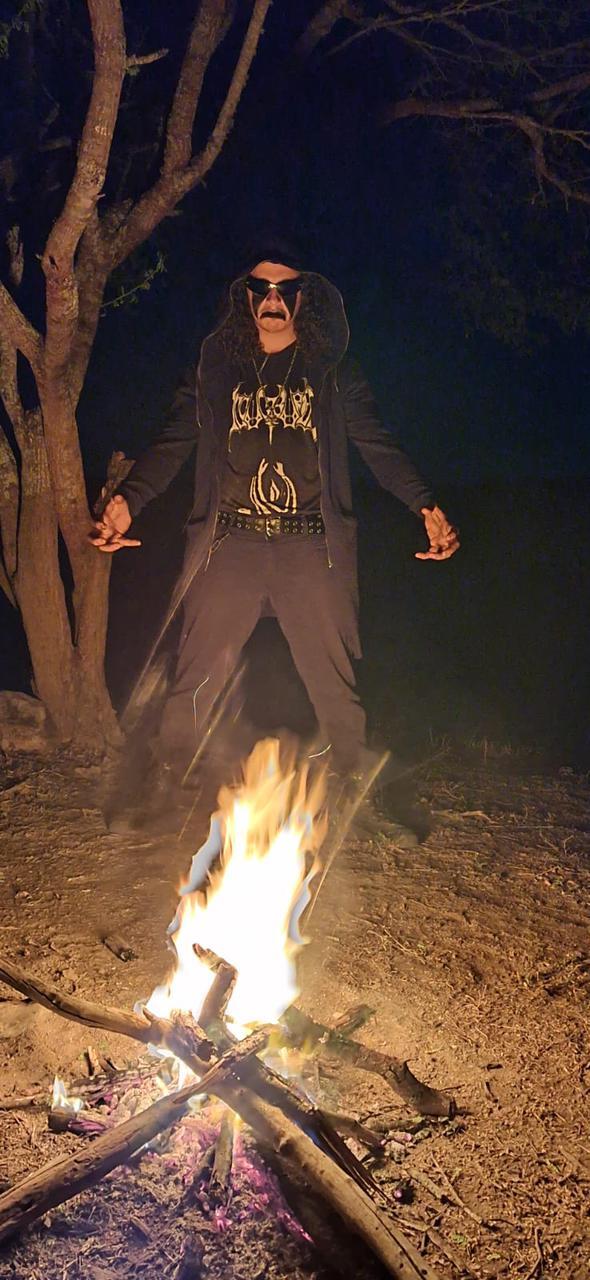
Pedro
Do you see any differences between the Brazilian Metal Market & the EU Metal Market (Labels, Bands, Fans etc)?
The difference is vast – and any Brazilian extreme metal band that has tried to operate in both markets can confirm this. Our perception is that while in Europe the underground is hard by choice (it’s about maintaining authenticity), in Brazil it’s hard out of pure necessity. Abroad, even obscure bands have access to basic infrastructure: specialized labels that invest in vinyl pressings and organized tours, fans willing to pay for physical material, and a scene that has been established for decades. Here, we are forced to be self-sufficient: the band becomes its own label, roadie, producer, and promoter. What in Europe is a natural step (like releasing an LP or going on a regional tour), in Brazil becomes a monumental effort – and often, a calculated loss. Brazilian headbangers are just as passionate as their European counterparts, but with less purchasing power. We've heard stories of Brazilians saving for months to buy a CD, while in Germany or Sweden, the same disc is bought without a second thought. In other words, the passion for Metal is the same, but the material conditions are not. let’s not romanticize it: Europe also has its issues (band saturation, passing trends). But the big difference is that there, extreme metal is treated as culture – here, it’s seen as “crazy noise.” While European bands receive cultural grants to record albums, in Brazil we make do with home studios and crowdfunding. In the end, what unites us is our determination. Bands like Sarcófago and Sepultura have proven that Brazil can create world-class metal – but no one here is under any illusions: we do this for love, because if it depended on the conditions, we would have already given up. The Brazilian underground is a fight of resistance, and every show, every release, is an act of rebellion.
Tell us a few things about the New Underground Metal Scene in Brazil (Bands, Fanzines, Webzines, Metal Clubs etc.)
The underground Metal scene in Brazil is plural, vibrant, and deeply shaped by regional differences — and understanding that is essential. You can’t really talk about “one” national scene in a country with continental dimensions. What happens in the South or Southeast is quite different from what beats here in the Northeast, especially in Paraíba, where extreme metal moves forward with its own strength and a strong sense of cultural resistance. In the Northeast — and more specifically in Campina Grande — the history of extreme metal carries a weight that can’t be ignored. Our city was once a true breeding ground for nationally recognized bands, such as Nephastus, which brought Paraíba’s thrash metal to a respected level across Brazil in the '80s and '90s. And that legacy didn’t fade with time — today, we’re seeing a new generation of bands rise with full force, carrying not just the raw aggression typical of extreme metal, but also a technical level that rivals any region in the country or even the world. Original production is alive and well. Local bands are gaining recognition for their cohesive sound, sharp lyrics, and refusal to compromise their unique identity. Around here, the underground doesn’t live off nostalgia — it’s constantly reinventing itself through hard work, creativity, and above all, passion. That’s why fanzines like Deliver Zine are still essential — they document, connect, and empower this scene, acting as living records of Northeastern cultural resistance. On the other hand, access to venues remains one of our biggest challenges. There are very few places willing to host original bands, especially those playing extreme metal. In this context, venues like The Pub, which functions as both a bar and a live house, become true symbols of resistance. It’s in places like these that we keep the culture alive, create real connections with the audience, and make the music happen in the most direct and raw way possible. The audience at metal shows in Campina Grande, though not large in number, is fiercely loyal and genuine. These are people who are there not because it's trendy, but because they live and breathe the music — they show up, buy merch, support local bands, and keep the flame alive with an energy that makes every gig feel huge. They are an essential part of the scene, and without them, none of this would survive. Every headbanger who shows up carries a piece of the resistance on their back — and that’s what keeps the city’s underground scene alive and kicking. At the end of the day, what we have here isn’t just a scene — it’s a trench. There’s nom institutional support, no abundance of infrastructure — but there’s a collective sense of belonging and a relentless drive to keep making noise, no matter what. Campina Grande remains a boiling point for Northeastern metal. And as long as there’s an amp plugged in, there will be screams, distortion, and resistance.
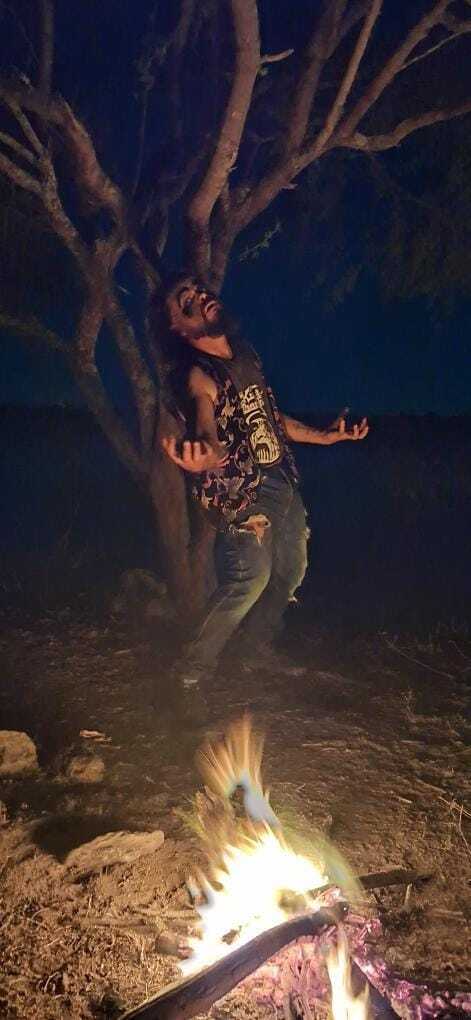
Kovot
Do you know anything about the Hellenic Metal Scene?
Absolutely! We're very familiar with the Hellenic metal scene, and several bands from there have influenced us in an immeasurable way. Greece has a unique tradition in extreme metal, with a mystical, ritualistic sound that has always caught our attention. Bands like Rotting Christ, Varathron, Naer Mataron, and Zemial are constant references for us — both in atmosphere and artistic attitude. In fact, our drummer, Alisson Hell, often says that one of his biggest influences when composing for Atro is a band called Hierophant's Descent, which carries that dark and occult vibe so characteristic of the Greek scene. It's a legacy that truly inspires us.
What are your future plans?
We’ve just released our album “O Eremita” and are currently in the promotion phase — playing shows, spreading our material, and connecting our music with those who truly feel the weight of the sound. However, we’re already preparing ourselves, both emotionally and creatively, to enter a new cycle of songwriting. Our aim is to channel everything we’re experiencing and turn it into new hymns — intense, honest, and viscerally human. We want to keep creating music that not only expresses what we feel, but also serves as a mirror for those who, in some way, share the same anguish, questions, and fury that drive us.
Thank you very much for your time & keep up the good work! The closure is yours.
We are deeply grateful to Filthy Dogs of Metal for giving us this space and the opportunity to share our music and vision with such an intense and genuine audience. It’s a privilege to be part of a scene where metal is not just a sound, but a form of resistance. For anyone who wants to get in touch, learn more about Atro, or follow our next steps, feel free to reach out through our Instagram profile or our YouTube channel. The struggle continues, and our music will echo as long as there’s distortion. “In the silence of pain, fury becomes sound.”
By Steve the Filthy Dog.
ATRO CONTACT:
https://www.facebook.com/AtroDoom
https://www.instagram.com/atro.doom/
